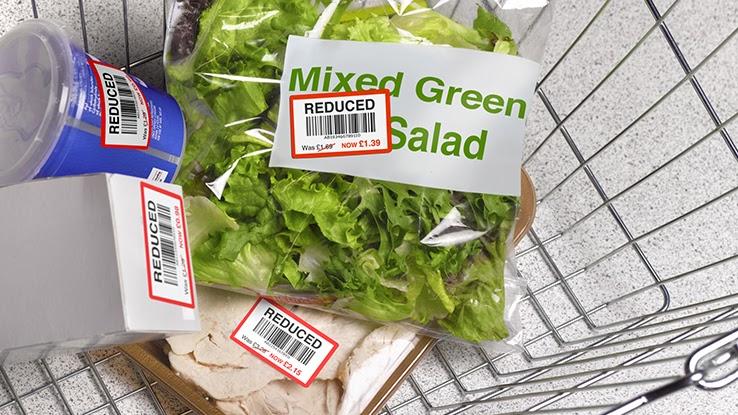
If you’ve started to get serious about achieving and maintaining good financial health, you’ve heard about how it’s important to save money. Whether you’re planning to pay down debt with it or save it for retirement, keeping as much of your hard-earned cash as possible in your own hands is key for helping you reach those goals. Budgeting is one way to not only help you see where you’re spending your money but to also identify areas where you can start saving.
When it comes to saving, perhaps nobody knows how to do it better than extreme couponers — you know the people featured on reality shows who, by clipping the right coupons and shopping the right sales, manage to pay just a few cents for hundreds of dollars’ worth of groceries. It’s true that they do go to what some of us might call excessive lengths to spend less by using coupons and finding the best deals.
But the various techniques these intrepid shoppers use don’t only have to apply to couponing — they can also apply to the discipline and practice of budgeting. And using them will take you further on the road to financial health as you track what you’re spending and reel in extra costs.
Remember That It’s All About Timing

Coupon-related savings don’t always happen immediately. Finding great deals requires regularly spending time clipping coupons and (sometimes) patiently waiting for a store or a manufacturer to put items on sale that you’re looking for. It’s only at that point that couponers take advantage of the great discounts.
The lesson here? Better budgeting, and the spending discipline that goes with it, doesn’t happen overnight either. It can take time, and it’s not something you want to rush. Before you build the perfect budget, get an idea about your current spending habits by listing every expense for the month. From rent and car payments to insurance and streaming services, no expense is too big or small to include. You may also want to make secondary budgets within your spending categories. For example, if you’ve budgeted $500 a month for grocery spending, create a budget and a plan for each shopping trip. Know what you want to buy and how much you want to spend.
Once you know what your budget is, it’s possible that the disciplines of couponing and budgeting can connect, too. For example, if you know what you want to spend on a grocery shopping trip, try to match items you want with coupons and sales that are available.
Buy in Bulk to Save More

Sometimes, couponers need to be ready to purchase multiple items at once to take advantage of great deals. For example, they may only be able to purchase shampoo at 30% off if they buy four or more bottles at the same time. In some cases, extreme couponers might purchase 100 units of a certain item at one time and store them until they’re needed.
This principle highlights the benefits of buying in bulk, which can help you stretch your budget further because you pay less than you would buying individual items. Why pay $4.99 a pound for meat that you can buy for $1 cheaper if you simply buy more of it? Savvy shoppers might even have memberships at warehouse stores like Costco or Sam’s Club that specialize in offering bulk purchases.
Buying in bulk can be a great tactic, but it’s not without risk. Be sure that you truly will use the number of items you’re purchasing — or that you’ve located someone else to share the purchase with so nothing goes to waste. If it’s not something you’d already purchase for full price in smaller quantities, it probably won’t become something you’ll use just because you got a deal. Also, be aware of the expiration dates on perishable products so they don’t go bad before you’ve had the chance to use them.
Organize Your Budget — and Maintain It

Extreme couponers have systems in place to track their savings opportunities. They maintain spreadsheets, file folders and binders to organize their coupons, track their spending and make sure that, at a moment’s notice, they can identify the best deals available.
Getting organized can also help when you’re keeping track of income and spending for your budget. You can use spreadsheets to establish and track various budget categories or get a clearer picture of the flow of your money over a given week, month or year. Smart budgeters may also use binders or either electronic or hard-copy file folders to save and manage receipts in case they want to double-check spending over time or need these items for filing taxes. You’ll likewise want to create a system for managing bills that’s intuitive, helps you file effectively and prompts you to pay them on time.
Understand Store Sales Patterns

Understanding retail sales cycles can help you locate multiple money-saving opportunities that keep your budget on track. One way to get a clearer idea about a store’s sales pattern is to sign up for its loyalty program. This will not only help you avoid missing a store’s sale routine, but the program may even give you bonus points for making certain purchases or give you additional savings on a product category you buy from frequently. Extreme couponers also know to take advantage of different couponing methods in multiple stores and through multiple brands.
Similarly to the way couponers look for store-based or retail brand-driven savings patterns, you should also look at your spending patterns over time. As you identify what goes on sale at your favorite stores and when, you’ll likely see patterns start to appear. You can then begin to anticipate these cycles and tailor your budget to accommodate purchases you want to make when things go on sale. You’ll also find opportunities to spend less and sync up the timing of your spending in a certain budget category.
Use Digital Tools Wisely

In addition to stores that offer coupons, a plentiful number of couponer-oriented websites use every tool at their disposal to make things easier for their customers. They might include search features you can use to find printable coupons or digital wallets where you can “clip” and store coupons for later use. They vary in their offerings, with some providing product-specific coupons and others offering deals for certain retailers.
There are similar tools available to help you with general budgeting, too. One example is Mint.com. Sites like this help you become a tech-savvy budgeter and track what you’re spending while automatically categorizing your purchases and expenditures — all with minimal effort. To keep things easy, these sites also connect with online accounts you already have for credit cards, banks and retailers.





